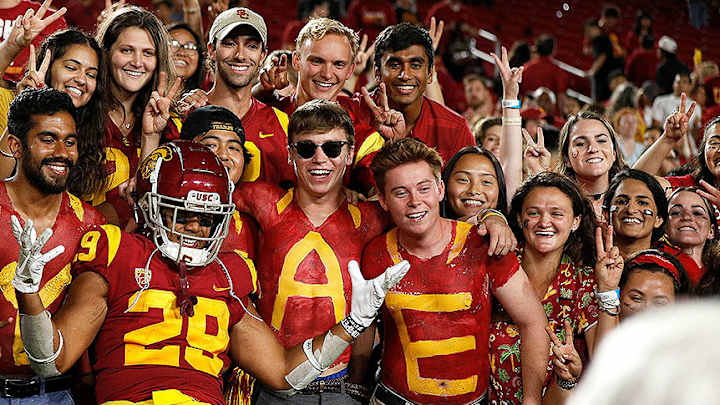As NCAA Gets Dragged Toward Just Change, Not Every Aftereffect May Be Positive

Two statements. Agree or disagree?
1. College athletes should be allowed to profit off their name, image and likeness.
This is the essence of California’s new Fair Play to Pay Act, and it’s a drum a lot of us have beaten for years. It seems completely just, doesn’t it? Nobody stops English majors from selling novels or music majors from putting their names on concert t-shirts. If Trevor Lawrence or Cassius Winston can make some money on the side, who is the NCAA to stop them?
2. College athletes should be allowed to transfer and play right away.
This one feels fair, too. The NCAA has moved in this direction already, with graduate transfers and exceptions for “extraordinary, extenuating, mitigating circumstances.” Why not just abolish this antiquated rule? Why should Jalen Hurts or Justin Fields have to sit out a year? They just wanted to play football. Let them play football. Who is the NCAA to force them to wait?
Reasonable people can agree with both statements. I find myself agreeing with them. But let’s anticipate what happens if college athletes can profit off their likeness and can transfer and play right away. Players will essentially be free agents after every season—free to sell their services, literally, to the highest bidder. Oh, officially the schools couldn’t pay them. But if the booster who owns a Norman car dealership offers Hurts $300,000 to be the face of his marketing campaign, as long as he (wink-wink) chooses a nearby school, who is going to stop him?
You can argue that this is also fair. College stars are Americans with market value. They should be allowed to capitalize on it. You can even argue that this happens already, which it certainly does—there are plenty of programs with boosters who break NCAA rules to buy recruits.
But this is not what college sports purports to be. It goes against what drew us to college sports in the first place. And I think it would be wise for everybody to take a moment and ask where this is going, and what we will think of it when we get there.
Many people who did not grow up in the U.S. find the American college-sports phenomenon to be absolutely insane. I love college sports, and I find them insane. I mean, imagine that college athletics did not exist. And imagine one of your friends founded a university. And imagine her saying, “We’re going to have a law school and a business school and a variety of undergraduate programs, and also, I’m going to pay somebody $4 million a year to give full scholarships to people who may not be academically qualified to go here, because watching football is fun.” You might think that person was insane.
But here we are. It works largely because college sports give us a sense of community. We aren’t just watching minor-league athletes. We’re watching students at the school we love. Some of them are lousy students, some chose easy majors and some might have chosen the school because a booster bought their mom a house. But we can look at that field or court and believe we are watching students.
If players routinely and publicly choose teams based on money, does that change the equation? Would the product be nearly as appealing?
Picture this scenario: a sophomore quarterback gets off to a surprisingly hot start. He engineers a huge upset. He is a leading Heisman Trophy candidate. And so he makes a wise business decision: He enters the transfer portal.
And he starts to feel out offers. They don’t just come from boosters. Nike and Adidas are willing to pay him more for his likeness if he chooses one of their flagship schools. That happens now—this is why Kansas hoops is in trouble—but imagine it happening constantly, publicly and legally. And so the quarterback bails on his team after four games so he can make more money and play for a higher-profile team the next year. It is his right.
Now imagine this happening all over the place all the time. No, not everybody will cash in. But the idea that only a few players will make money seems hopelessly naïve. It would not surprise me if, on many rosters, the majority of players negotiate for the best deal for their “likeness.”
That could radically change the emotional experience of watching college sports. That doesn’t mean it would be wrong. It doesn’t mean the quarterback in this scenario should care. But it would be quite different, wouldn’t it?
The NCAA has often argued that people watch the teams, not the athletes. It is disingenuous and self-serving, but it is not completely without merit. We do cheer for athletes largely because of the universities they represent. If Alabama and Auburn stopped fielding football teams tomorrow, and Birmingham got a minor-league team, do you think it would be as popular?
Wherever the California law leads, change feels inevitable. Nobody should feel bad for the schools. They put themselves in this position by trying to have it both ways—by acting like a business when it comes to producing revenue and claiming to be universities when it comes to compensating players. And it’s hard to watch coaches make close to eight figures while schools claim there is no money for players.
Morally, these changes feel right. But in practice … well, we’ll see. Maybe college sports are so embedded in society that we will roll with changes like these. Maybe we really do want the best players to be well-paid free agents. Maybe we don’t even need to imagine them as students playing for the schools they love. Maybe.
